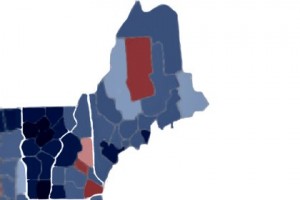 A few days before the election, a friend shared a This American Life segment from the Nov. 2 program about New Hampshire’s state house titled “Nothing in Moderation.” (Click here to launch their player in a window to listen. It’s about a half hour long.) The story was heartbreaking; it was about how things had changed since the Tea Party took control of the state house two years ago, and effectively destroyed everything that is wonderful about the Northern New England legislative process. Instead of bipartisan, friendly problem solving, they brought in the tactics of demonizing opponents, using a majority to steamroll over opposition, and not listening to ideas from the other side. Their basic mantra was that government was bad. Outside money dirtied campaigning in a state where it had been possible to run for election — at least at the state level — with no budget, just by going door-to-door and showing up at town meetings and county fairs. And, like the national movement writ small, they mixed in regressive social policies that most of their supporters hadn’t asked for and didn’t want.
A few days before the election, a friend shared a This American Life segment from the Nov. 2 program about New Hampshire’s state house titled “Nothing in Moderation.” (Click here to launch their player in a window to listen. It’s about a half hour long.) The story was heartbreaking; it was about how things had changed since the Tea Party took control of the state house two years ago, and effectively destroyed everything that is wonderful about the Northern New England legislative process. Instead of bipartisan, friendly problem solving, they brought in the tactics of demonizing opponents, using a majority to steamroll over opposition, and not listening to ideas from the other side. Their basic mantra was that government was bad. Outside money dirtied campaigning in a state where it had been possible to run for election — at least at the state level — with no budget, just by going door-to-door and showing up at town meetings and county fairs. And, like the national movement writ small, they mixed in regressive social policies that most of their supporters hadn’t asked for and didn’t want.
My friend knew I’d be interested because I’d spent years living in rural Maine working in local government and state and national politics. While Maine and New Hampshire have tended to differ — with Maine leaning Democratic and New Hampshire leaning Republican — they both have a libertarian and locally-based spirit. The segment’s description of New Hampshire’s town hall meetings and large vibrant citizen legislature could just as easily have been describing the Maine I remember.
Since ’08, though, I’ve been getting reports from old friends in Maine of similar shifts, and in general of a coarsening of the tone of politics. When I lived and did politics in Maine, there’s no question there was an anti-government streak; I specifically remember the frustration of struggling as a member of my local government with top-down regulations that didn’t always make sense on the ground. But the tone was almost always civil. Unspoken but clearly present was the spiritual principle that we are all neighbors. That we have a social contract with each other of, if not support, at least respect.
I remember in 1992 going to town hall meetings with then-state senate candidate and now U.S. Congresswoman Chellie Pingree. She’d get up front and talk for a few minutes about her values and what she hoped to accomplish and everyone, progressive to hard right, would listen respectfully, and very possibly vote for her because she was a local member of the community who seemed like a decent woman who would do her best. It seemed the top criteria for election was integrity.
But I’ve been hearing in recent years of reactions to Obama that included birther craziness and thinly veiled racism, and overall of a lot more anger across the political spectrum directed at the “other side”; a lot less civility.
Well, at the national level the House may not have reverted to Democratic hands, but there was certainly a repudiation of the Tea Party. And in New Hampshire, last Tuesday, the state house flipped from a veto-proof Republican majority to a strong Democratic majority. Bill O’Brien, the heavy-handed Tea Party speaker of the house featured in the This American Life segment, is just one of 400 state house members now — not even in the minority leadership on his side. No more banning the media from meetings; no more punishing open-minded legislators in his own party.
And if you have been following the national races, you might have heard an idea floated a few days before the election but considered very unlikely — that with the election of two Democratic women over incumbent male Republican opponents for the House and a Democratic woman governor, New Hampshire might become the first state in the country where all major political offices are held by women. And then it happened. The governor, both senators and both house members from New Hampshire are women.
Next door, Maine which two years ago had elected a now highly-unpopular Tea Party governor, Paul LePage (who several months ago said in an official address after the Supreme Court upheld Obamacare that the I.R.S.’s ability to collect fines from those who refuse to participate meant you had to “pay the new Gestapo — the IRS”), now regrets that decision; the state senate and state house both flipped from Republican to Democratic, and they elected progressive independent Angus King over a Karl Rove-backed Republican to replace retiring Republican senator Olympia Snowe. I don’t think many Democrats are happy to see the moderate Snowe leave, but of course they’re happy to pick up a seat. Snowe left because her party has become so ugly. She and Sue Collins, the other Maine senator, who I campaigned for when living there, have often been the only two voices in the Republican caucus arguing for the safety net.
So both New Hampshire and Maine legislative representations have gone from mostly Republican control to mostly Democratic control in the past week, and both voted fore President Obama’s reelection. While I celebrate the repudiation of the Tea Party, I’m also saddened by the fading of the Northeastern Liberal Republican, of which Senator Sue Collins is one of the last standing. I said in my last piece that thoughtful two-sided debate is essential. I’d actually go a step further and say that a two-sided or multi-sided debate within each party leads to the best governance. When there were substantial blocks of liberal Republicans and conservative Democrats, then the parties had to sort out issues within their caucuses first, which laid the groundwork for coming together across party lines. Most of both groups have been purged — it’s been an active strategy on the Republican side, knocking out incumbent moderates during the primary season, and a passive one on the Democratic side, where many of the blue dogs have lost in general elections to Republicans.
I see hope in the results of Northern New England, though. With the vote to approve gay marriage in Maine as well, there has been an overall sweep repudiating the politics of fear, anger and exclusion. Maybe a new generation of liberal Republicans will emerge to fill the vacuum left by the departure of the Tea Party’s hot air. And maybe, once again, Northern New England can be an example to the nation of how politics can and should be done — grassroots-driven, open-minded, civil.












